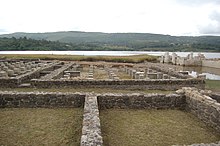Ethnonym

Historical sources
The Quaquerni are also known by the name Quarquerni,[2] Querquernoi,[3] or Quacernoi. Their ethnonym is registered as Κουακερνοί (Kouakernoí), by Greek geographer Ptolemy in his Geographies.[4] Scholars see a possible connection with Venetic Quarqueni, as registered by Pliny[5][6] and located somewhere in historical Istria.[7]
Etymology
The name Querquerni is probably related to Latin quercus ("oak"),[8][9] which stems from Proto-Indo-European root *pérkʷus, meaning "oak". It is probably a Q-Celtic formation meaning "the Oak People / Warriors",[10][1][11][12][13] related to:
- Middle Irish ceirt "apple-tree", Middle Welsh perth "bush", from *kʷerxt-, from an earlier *kʷerkʷt- < *perkʷt-[14]
- the Continental Celtic toponyms Hercynian forest and the Pannonian tribe Hercuniates, where the early delabialization of kʷ before u prevented p.. kʷ > kʷ .. kʷ:[14][15] so *perkʷunia > *perkunia > *fercunia; note that there is no u after kʷ in *kʷerkʷern-. They are all related to the Germanic branch maybe borrowed from Pre-Celtic *percunia, that is to say : Gothic fairgunni "mountain (covered with oaks)", Anglo-Saxon firgen- "mountain wood", Old High German Fergunna, Virgundia waldus, etc.[16]
- French place names derived from the forms Perciacum, Percoialum, Percunia, Percetum, Erciacum, etc.[10]